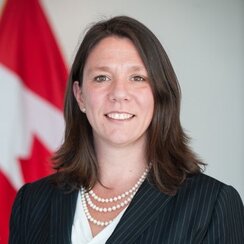A Network for the Heartland and Beyond
SPEAKERS:
Keynote: Rachel McCormick, Consul General of Canada in Dallas
Aaron Annable, Counsellor, Embassy of Canada, Washington, D.C.
Hamid Arastoopour, Director, Wanger Institute for Sustainability and Energy Research, Illinois Institute of Technology
Deborah Philbrick, Program Officer, Climate Solutions
Keynote: Rachel McCormick, Consul General of Canada in Dallas
Aaron Annable, Counsellor, Embassy of Canada, Washington, D.C.
Hamid Arastoopour, Director, Wanger Institute for Sustainability and Energy Research, Illinois Institute of Technology
Deborah Philbrick, Program Officer, Climate Solutions



